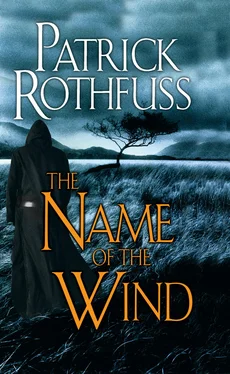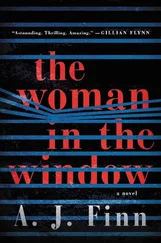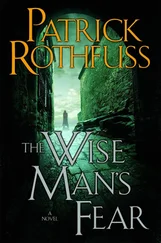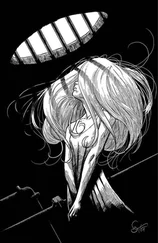My mother broke in softly. “I remember too, dear, but I think it was just his small hands. He was awfully young. . . .”
“I bet it didn’t stall him for long,” Ben said quietly. “He does have marvelous hands; my mother would have called them magician’s fingers.”
My father smiled. “He gets them from his mother, delicate, but strong. Perfect for scrubbing pots, eh woman?”
My mother swatted him, then caught one of his hands in her own and unfolded it for Ben to see. “He gets them from his father, graceful and gentle. Perfect for seducing young nobles’ daughters.” My father started to protest, but she ignored him. “With his eyes and those hands there won’t be a woman safe in all the world when he starts hunting after the ladies.”
“Courting, dear,” my father corrected gently.
“Semantics,” she shrugged. “It’s all a chase, and when the race is done, I think I pity women chaste who run.” She leaned back against my father, keeping his hand in her lap. She tilted her head slightly and he took his cue, leaning in to kiss the corner of her mouth.
“Amen,” Ben said, raising his mug in salute.
My father put his other arm around her and gave her a squeeze. “I still don’t see what you’re getting at, Ben.”
“He does everything that way, quick as a whip, hardly ever makes mistakes. I’ll bet he knows every song you’ve ever sung to him. He knows more about what’s in my wagon than I do.”
He picked up the jug and uncorked it. “It’s not just memorization though. He understands. Half the things I’ve been meaning to show him he’s already figured out for himself.”
Ben refilled my mother’s cup. “He’s eleven. Have you ever known a boy his age who talks the way he does? A great deal of it comes from living in such an enlightened atmosphere.” Ben gestured to the wagons. “But most eleven-year-olds’ deepest thoughts have to do with skipping stones, and how to swing a cat by the tail.”
My mother laughed like bells, but Abenthy’s face was serious. “It’s true, lady. I’ve had older students that would have loved to do half as well.” He grinned. “If I had his hands, and one quarter his wit, I’d be eating off silver plates inside a year.”
There was a lull. My mother spoke softly, “I remember when he was just a little baby, toddling around. Watching, always watching. With clear bright eyes that looked like they wanted to swallow up the world.” Her voice had a little quaver in it. My father put his arm around her and she rested her head on his chest.
The next silence was longer. I was considering sneaking away when my father broke it. “What is it you suggest we do?” His voice was a mix of mild concern and fatherly pride.
Ben smiled gently. “Nothing except to think about what options you might give him when the time comes. He will leave his mark on the world as one of the best.”
“The best what?” my father rumbled.
“Whatever he chooses. If he stays here I don’t doubt he will become the next Illien.”
My father smiled. Illien is the troupers’ hero. The only truly famous Edema Ruh in all of history. All our oldest, best songs are his songs.
What’s more, if you believed the stories, Illien reinvented the lute in his lifetime. A master luthier, Illien transformed the archaic, fragile, unwieldy court lute into the marvelous, versatile, seven-string trouper’s lute we use today. The same stories claim Illien’s own lute had eight strings in all.
“Illien. I like that thought,” my mother said. “Kings coming from miles away to hear my little Kvothe play.”
“His music stopping barroom brawls and border wars.” Ben smiled.
“The wild women in his lap,” my father enthused, “laying their breasts on his head.”
There was a moment of stunned silence. Then my mother spoke slowly, with an edge to her voice. “I think you mean ‘wild beasts laying their heads in his lap.’ ”
“Do I?”
Ben coughed and continued. “If he decides to become an arcanist, I bet he’ll have a royal appointment by the time he’s twenty-four. If he gets it into his head to be a merchant I don’t doubt he’ll own half the world by the time he dies.”
My father’s brows knitted together. Ben smiled and said, “Don’t worry about the last one. He’s too curious for a merchant.”
Ben paused as if considering his next words very carefully. “He’d be accepted into the University, you know. Not for years, of course. Seventeen is about as young as they go, but I have no doubts about . . .”
I missed the rest of what Ben said. The University! I had come to think of it in the same way most children think of the Fae court, a mythical place reserved for dreaming about. A school the size of a small town. Ten times ten thousand books. People who would know the answers to any question I could ever ask. . . .
It was quiet when I turned my attention back to them.
My father was looking down at my mother, nestled under his arm. “How about it, woman? Did you happen to bed down with some wandering God a dozen years ago? That might solve our little mystery.”
She swatted at him playfully, and a thoughtful look crossed her face. “Come to think of it, there was a night, about a dozen years ago, a man came to me. He bound me with kisses and cords of chorded song. He robbed me of my virtue and stole me away.” She paused, “But he didn’t have red hair. Couldn’t be him.”
She smiled wickedly at my father, who appeared a little embarrassed. Then she kissed him. He kissed her back.
That’s how I like to remember them today. I snuck away with thoughts of the University dancing in my head.
CHAPTER THIRTEEN
Interlude—Flesh with Blood Beneath
In the Waystone Inn there was a silence. It surrounded the two men sitting at a table in an otherwise empty room. Kvothe had stopped speaking, and while he seemed to be staring down at his folded hands, in reality his eyes were far away. When he finally pulled his gaze upward, he seemed almost surprised to find Chronicler sitting across the table, pen poised above his inkwell.
Kvothe let out his breath self-consciously and motioned Chronicler to set down his pen. After a moment Chronicler complied, wiping the nib of the pen on a clean cloth before setting it down.
“I could use a drink,” Kvothe announced suddenly, as if he were surprised. “I haven’t told many stories lately, and I find myself unreasonably dry.” He rose smoothly from the table and began to make his way through the maze of empty tables toward the empty bar. “I can offer you almost anything, dark ale, pale wine, spiced cider, chocolate, coffee. . . .”
Chronicler raised an eyebrow. “Chocolate would be wonderful, if you have it. I wouldn’t expect to find that sort of thing this far from . . .” He cleared his throat politely. “Well, anywhere.”
“We have everything here at the Waystone,” Kvothe said, making an offhand gesture to the empty room. “Excepting any customers, of course.” He brought an earthenware jug up from underneath the bar, then set it on the bar with a hollow sound. He sighed before calling out, “Bast! Bring up some cider, would you?”
An indistinct reply echoed from a doorway at the back of the room.
“Bast,” Kvothe chided, seemingly too quiet to be heard.
“Shag down here and get it yourself, you hack!” the voice shouted up from the basement. “I’m in the middle of something.”
“Hired help?” Chronicler asked.
Kvothe leaned his elbows on the bar and smiled indulgently.
After a moment, the sound of someone climbing a set of wooden stairs in hard-soled boots echoed from the doorway. Bast stepped into the room, muttering under his breath.
Читать дальше











